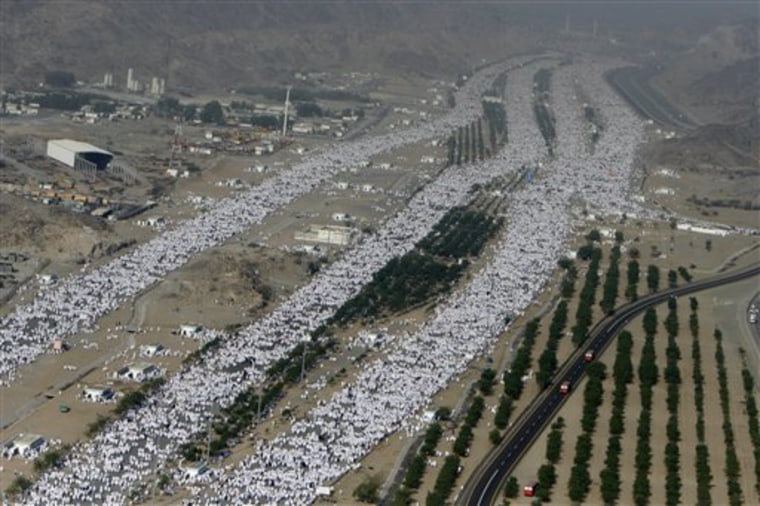Millions of Muslims marked the zenith of the annual hajj Tuesday, praying for God's forgiveness on a rocky desert hill here where in Muslim tradition Adam and Eve were reunited after leaving Eden.
The ritual of standing at Mount Rahma is the most spiritual moment of the pilgrimage, when Muslims believe God will grant whatever prayers they make.
Among the faithful this year is Iranian President Mahmoud Ahmadinejad, who on Tuesday stopped by the vast tent city where pilgrims are housed on the plateau called Mount Arafat to visit with Iranians there, according to Tehran's state broadcasting company.
However, Ahmadinejad stayed away from a brief rally held by several hundred Iranian pilgrims, calling on Muslims to unite against the U.S. and Israel, which they said "dominate the Muslim world."
The rally is an annual occurrence at hajj, arranged by the Iranian government. An envoy read a statement from Iran's supreme leader Ayatollah Ali Khamenei to the faithful, telling them that hajj requires them to show love for God and to "expel, fight and stand up to Satan" — lessons Muslims "have to learn all over the world."
"They are hatching plots in Palestine, Lebanon, Iraq and Afghanistan and pitting one section of Muslims against the other," Ayatollah Mohammadi Reyshahri said, reading the statement.
A few at the gathering shouted "Death to America!" and "Death to Israel!" and called the two nations the enemies of God. But there was none of the fist shaking that marks such chants at rallies back home in Iran — a nod to the hajj's traditional lack of aggressiveness, arguments and disputes.
The protest, directed by Iranian security officers, stayed strictly inside the encampment, following Saudi rules. In the fervent early years after Iran's 1979 Islamic revolution, Iranian pilgrims held public protests outside their camps during hajj rituals, leading to friction with Saudi authorities that climaxed in 1987 when a protest in Mecca turned into a clash with Saudi police that killed several hundred Iranians, Saudis and others. In recent years, Iran has put less effort into the small yearly rally inside the camp.
On Tuesday, most of the Iranians paid little attention to the envoy's speech.
Azam Rahimi, 44, a teacher, said she didn't listen.
"We've heard these slogans for so many years that we know them by heart," she said. But she added, "Of course we don't want America to impose its culture on us. It's the duty of all Muslims to stop this from happening."
Saudi pilgrim Ali Saadi and his friends sat on a plastic mat on a sidewalk nearby.
"This is not the place for politics," said Saadi, a 58-year-old businessman. "Hajj is when you get close to God. I guess they have their own justification. As their hosts, we can't stop them."
Mainly Sunni Muslim Saudi Arabia and mainly Shiite Iran are regional rivals, with Saudis concerned over the increasing influence of Iran in the Middle East. The two countries back opposing camps in the crises in Iraq and Lebanon.
Millions in pilgrimage
Around 3 million Muslims from around the world are attending this year's hajj. They flooded into Arafat late Monday and early Tuesday. Lines of buses with pilgrims on the roofs packed highways leading into the site, while others on foot swarmed between the vehicles.
They climbed Mount Rahma, the rocky hill on Arafat where, it's believed, Adam and Eve were reunited after leaving Eden and sought God's forgiveness of their sins. They performed noon prayers at the Namira Mosque, where the Prophet Muhammad gave his last sermon.
Young children and old women begged for money as the crush of people pressed ahead on their way to Mount Rahma. Some spread out prayer beads, bags, umbrellas, and cookies on the pavement for sale.
Most pilgrims stay in the sprawling tent city, which is divided by country. But thousands of others slept in the open on blankets, in small makeshift plastic tents.
The Arafat rituals end at sunset Tuesday, after which the faithful move to the nearby Muzdalifah and spend the night there. They collect stones that they will take with them to Mina the next day with which to pelt the devil. This ritual commemorates Abraham's stoning of Satan when he tried to tempt him to disobey God.
